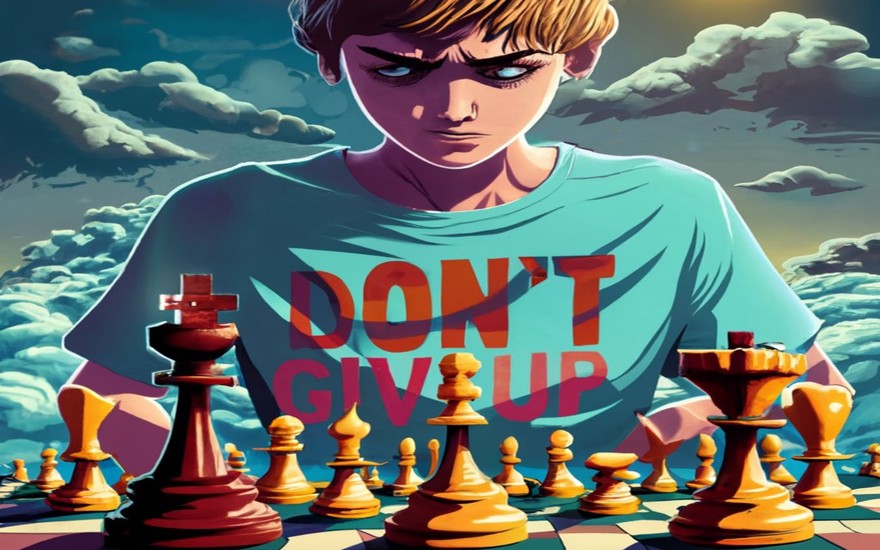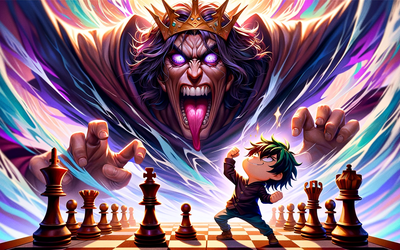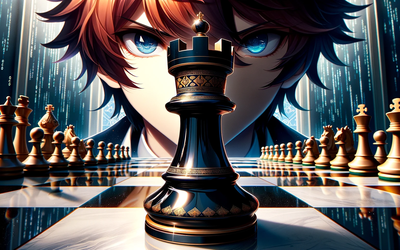
How to Beat Stronger Players: Part 3
Hey all!! Welcome to the third and final part of my series on beating stronger players. In my first two sections I talked about how playing too passively and playing too forcingly can both be dangerous traps that cause you to squander your chances against stronger opponents. In this section I’ll talk about the last way I’ve seen people go wrong over and over again in this situation.Link to Part 1: https://lichess.org/@/mmsanchezchess/blog/how-to-beat-stronger-chess-players-part-1/Sj4sGdOq
Link to Part 2: https://lichess.org/@/mmsanchezchess/blog/how-to-beat-stronger-players-part-2/DZxwft1Y
Part 3: Don’t give up!
An interesting phenomenon I’ve observed is that people fight much harder when they find themselves on the back foot against lower rated opponents, than they do against higher rated opponents. But why is this? My answer is two-pronged and largely psychological. As a 2200 player the thought of losing to a 1800 is devastating, whereas the thought of losing to a grandmaster is at most a little disappointing. Of course, this shouldn’t impact how hard you try to defend a position, but in practice I find it very often does.
Let me outline a rough game trajectory I’ve seen countless times in games between 2200ish players and IMs or GMs. The 2200 comes to the game much better prepared and gains an advantageous position out of the opening. Emboldened by their opening success, they play the middlegame quite well, and get very close to achieving a key breakthrough that will likely result in victory. However, the higher rated player defends tenaciously and keeps the position from completely falling apart. Eventually the 2200 starts to slip up subtly, and the position is equalized or even swings slightly in the favor of the GM. Discouraged by their poor change of fortune, the lower rated player is unable to defend very well, and quickly crumbles.
A second reason people defend worse against higher rated players than lower rated players is more conscious. If I’m dead lost against a lower rated player, I’m still optimistic that I’ll be able to trick them and find a way to save a game. However, when you are playing against a grandmaster, and think your position is busted, then it’s easy to fall into the trap of thinking what’s the point, there’s no way a GM will mess this up. Not only is this attitude completely unhelpful, but it’s also completely wrong! Grandmasters are humans too, and when faced with a tenacious resourceful defense, they’ll often err and let you back into the game.
To summarize, people defend worse against higher rated players, both because they lack the urgency they’d have if they were about to lose against a lower rated player, and because they are prone to feeling hopeless and incapable of making a strong opponent mess up. However natural they may feel, the first of these biases is wholly unproductive, and the second is simply unfounded. In GM Johanthan Rowson’s excellent book, The Seven Deadly Chess Sins, he talks about the concept of Infinite Resistance. He argues that no matter how strong the opponent, if you confront them with challenge after challenge and never let the game just end, errors in the conversion process will occur, and you’ll have the chance to save the game. Speaking from personal experience, having saved many hopeless positions and squandered many dominant ones, I can say with confidence he’s absolutely right.
Thanks so much to everyone who read through this and my other two blog posts on beating stronger opponents. I hope you all learned something that you can take away and apply in your own games. Stay tuned for next week, when I’ll be starting a series on a brand new topic!
More blog posts by mmsanchezchess

How to Play against Lower Rated Opponents Part 1: Know your Advantage
Previously, I have written a series on how to do well and score upsets against higher rated opponent…
Level Up Your Endgames Part 3: 2 Rook Endgame Ideas You Have to Know
In my first section I talked about how the strength of passed pawns depends significantly on what fi…
Level up your endgames Part 2: The Strengths and Weaknesses of the Minor Pieces
Hi Everyone! I’m back with the second part of my series on leveling up your endgame play. In my firs…